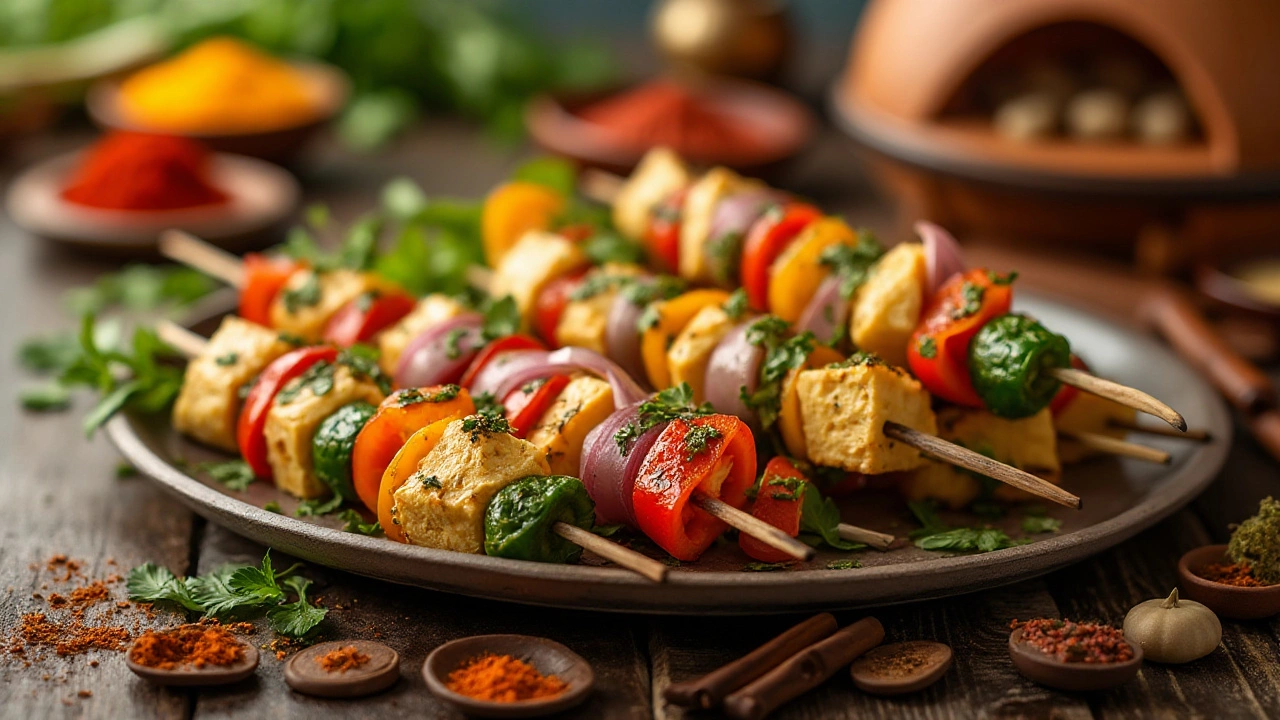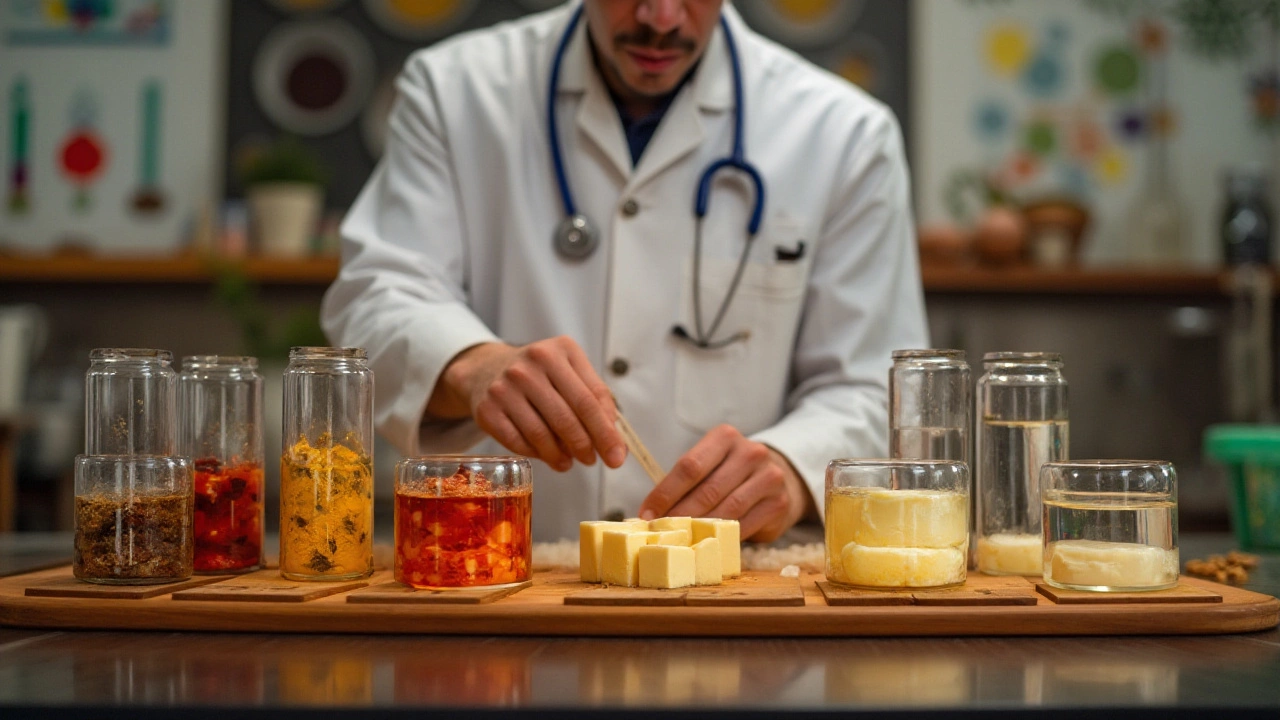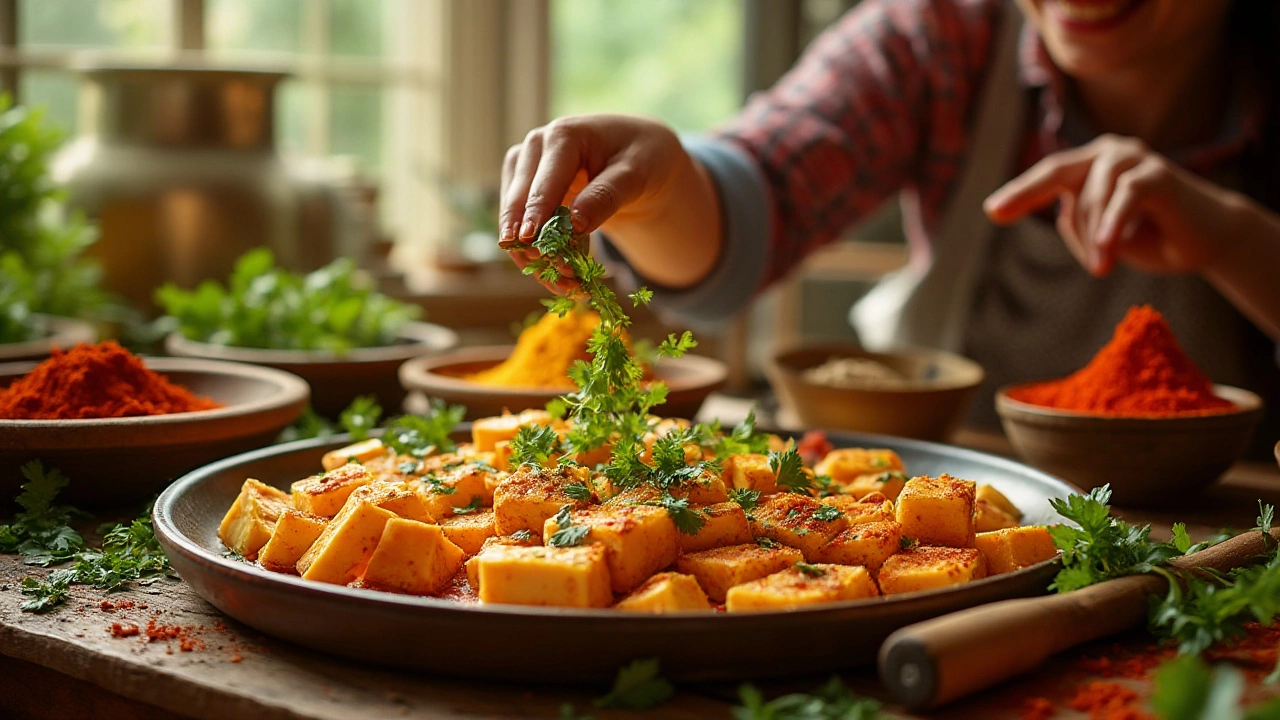Paneer, beloved in Indian cuisine, is a fresh cheese that carries a mild flavor and a slightly crumbly texture. While some prefer to enjoy its natural taste, many culinary enthusiasts choose to marinate paneer to introduce a broader palette of flavors. So, is marinating paneer a necessity or simply a preferred option?
The art of marination has long been employed to make ingredients tender and flavor-packed. When it comes to homemade paneer, the decision to marinate depends on the dish's desired complexity and the palate of the cook. Whether embracing the creamy, gentle taste of fresh paneer or infusing it with a bold marinade, understanding the process can enhance the culinary experience.
- Understanding Paneer and Its Flavor Profile
- The Science of Marination
- Should You Marinate Homemade Paneer?
- Popular Marinades for Paneer
- Creative Tips for Marinating Success
Understanding Paneer and Its Flavor Profile
Paneer stands as a staple ingredient in countless Indian dishes, celebrated for its versatility and subtle taste. Unlike many other cheeses, paneer is a non-melting fresh cheese that maintains its form when cooked, making it ideal for a variety of culinary applications. This unique characteristic is due to the method of production, which involves curdling milk with an acidic substance such as lemon juice or vinegar. The resulting cheese is then pressed to remove moisture, leading to the firm yet tender texture that paneer is known for. What makes paneer uniquely appealing is its ability to absorb the flavors of the spices and sauces it's cooked with, enhancing the dish's tastes without overshadowing them.
One of the charming aspects of paneer is its mild flavor, which is often described as milky and slightly sweet. Its softness and richness are reminiscent of mozzarella, yet unlike mozzarella, paneer doesn't melt when heated, allowing it to hold its shape in chunky, satisfying bites. This attribute has made it a popular choice not only in traditional Indian recipes but increasingly in global cuisine. Culinary experts often emphasize paneer's capacity to complement bold flavors, noting its role as a canvas for a myriad of spices and sauces.
"Paneer's strength lies in its simplicity," notes Chef Anjali Pathak, a renowned food writer. "It can take on the flavors of the spices and herbs it is paired with, which can make every bite an exploration of taste."
In India, paneer is often the star of vegetarian dishes such as Palak Paneer, a creamy spinach curry, or Paneer Tikka, where it is marinated in spices and grilled to perfection. On its own, room-temperature paneer may seem bland to some, which is why marination becomes a significant step in many recipes. Through marination, paneer can adopt heightened flavors, taking a curry or kebab from enjoyable to unforgettable. This characteristic makes it a darling of vegetarian cooking, providing protein and texture that appeal to both vegetarians and meat-eaters alike.
While paneer is widely available in stores, many prefer to make it at home to enjoy fresh flavors and desired consistency. Homemade paneer is easy to customize, allowing cooks to adjust firmness or incorporate herbs right into the cheese. When considering if one should marinate this homemade paneer, knowing its inherent flavor profile provides a useful foundation. Marinating isn't just about taste enhancement—it's about transforming a simple ingredient into something vibrant and dynamic.
The Science of Marination
Marination is a time-honored technique used not just to enhance flavors but to alter textures and lock in juiciness. At its core, marination is a way to infuse food items, such as homemade paneer, with a complex array of flavors, creating delightful experiences with each bite. When you marinate paneer, the porous surface absorbs the rich spices, herbs, or acids, allowing for a deeper penetration of taste. The process begins with the right selection of a marinade, which typically contains acidic ingredients like lemon juice, vinegar, or yogurt. These acids actively break down proteins on the paneer's surface, which can soften it slightly, making it more receptive to absorbing flavors. Interestingly, not all marinades are created equal. The type of acid and the duration of marination greatly influence the resulting taste and texture.
Science behind marination is more intricate than it seems. While many believe marination is purely a chemical interaction, there's an artistic element too. Acids like vinegar or lemon juice can provide a tangy punch; however, they also cause proteins to coagulate, slightly altering the density of paneer. This can be especially beneficial for those cooking paneer in high-heat methods like grilling or pan-frying since it can help achieve the elusive crispy exterior. On the contrary, using dairy-based acids such as yogurt not only tenderizes but also adds moisture, which can lead to a creamier texture. Culinary artists often recommend maintaining a balance to prevent texture distortions or overpowering flavor notes. A little-known fact is that certain enzymes found in dairy can further assist in tenderizing proteins, enhancing the marination effect.
Often culinary experts reference marination as a prelude to an orchestra, where each ingredient contributes uniquely. Marination doesn't just impart flavor through acids; oils in the mixture assist in distributing fat-soluble flavor compounds, like essential oils from herbs, evenly across the paneer's surface. This phenomenon is known as emulsification. By creating a homogenous mixture, spices amalgamate, crafting a coherent flavor profile that complements the paneer's subtlety. A curious aspect of marination is its interaction with time. While short marination periods can offer a superficial flavor coat, extended marination allows deeper infusion, often dictated by the concentration of ingredients. A prolonged marination can dramatically alter the paneer’s midsection, providing a burst of flavor across every edge. So, those marveling at the allure of marinated paneer ought to appreciate the science that art of marination encompasses.
According to a study featured in the Journal of Culinary Science, "The balance between time, acidity, and ingredients can revolutionize how we perceive marinated cuisines. It's the alchemy that transforms ordinary into extraordinary."
When it comes to marinating paneer, experimentation bears fruit. While traditional approaches lay a strong foundation, unconventional ingredients can offer pleasant surprises, expanding culinary horizons. Creating your own signature marinades can be invaluable, especially when handling homemade paneer, which can vary slightly in texture based on preparation method. A rule of thumb often suggested is to pair aromatic herbs with a primary spice, complemented by an acid and a touch of oil. Experimenting with spices like cumin or coriander can enhance the paneer’s intrinsic flavors, unlocking layers of taste that captivate the senses. Embracing various marination durations can also yield different results; for instance, a swift 30-minute soak can yield freshness, while an overnight dip deepens complexity.

Should You Marinate Homemade Paneer?
When it comes to culinary delights, homemade paneer offers a blank canvas. Imagine you're an artist, with a wheel of fresh paneer at hand, and the possibilities are as endless as your imagination. But should you take the time and effort to marinate it? For lovers of vibrant flavors, the answer often leans toward a resounding 'yes'. Marinating allows the paneer to absorb flavors deeply, enhancing its otherwise mild taste and weaving it seamlessly into the fabric of various recipes. This transformation can elevate dishes from simple to extraordinary, imbuing them with complexity that lingers on the palate.
One might wonder about the science behind marination—it's all about chemistry and patience. Acids in the marinade, like yogurt or lemon juice, can tenderize the paneer slightly, although overdoing it can lead to a mushy texture. This is where a balanced approach becomes essential. Spices and herbs bring an aromatic touch that can vary from subtly sweet to eye-wateringly spicy, depending on your preference. An interesting fact noted by chef and food historian Colleen Taylor Sen is, "Marination, an age-old practice, was originally a method to preserve foods. Today, it's about enhancing flavors and creating new taste experiences."
Given this perspective, the decision to marinate should also consider the intended dish. In a rich curry, you might allow the paneer to speak more boldly with a marinade, whereas in a salad or skewer, the natural flavor might be preferable. Cultural backgrounds also play a role; Indian cuisines often incorporate marinades that include ginger, garlic, garam masala, and turmeric, transforming paneer into a flavorful bite. In contrast, Mediterranean cuisines might opt for olive oil, lemon, and herbs, giving it a fresh, vibrant taste.
Key Considerations
When opting to marinate, the choice of ingredients and marination time are crucial. A quick marination might suffice for softer flavors, but if a stronger infusion is desired, leaving the paneer to soak overnight in the refrigerator ensures the flavors reach the core. However, remember not to overdo it; paneer’s softer structure can only absorb so much before losing its distinct character. The balance between time and taste is often guided by personal preference, but experimenting with varying times can lead to a personalized perfect balance.
Arguably, some might contend that marination isn't always necessary. For those who cherish the unique texture and lightness of homemade paneer, enjoying it in its original form is as delightful. After all, the appeal of paneer lies in its ability to adapt yet maintain its identity amid a host of flavors. Ultimately, the decision to marinate or not is less about necessity and more about exploring culinary art, bringing joy to the table with each recipe created.
Popular Marinades for Paneer
Exploring various marinades can turn simple homemade paneer into a culinary masterpiece. Among the most cherished marinades is the classic yogurt-based mixture, often combined with spices such as turmeric, cumin, coriander, and garam masala. This combination not only imparts a bright color to the paneer but also infuses it with a depth of flavor that resonates with the traditional tastes of Indian cuisine. The acidity of the yogurt helps in tenderizing the paneer, making it more succulent when cooked.
Another favored concoction is the spicy chili marinade. Here, dried red chilies are ground with ginger, garlic, and a dash of lemon juice. This blend creates a fiery paste that clings beautifully to the porous surface of the paneer, packing each bite with a spicy punch. For those who love a bit of heat, this marinade is a must-try. Not all marinades have to be extreme; a gentle herbal marinade using mint and cilantro offers a refreshing twist with a hint of earthiness and freshness.
For the more adventurous, incorporating international flavors can yield surprising results. A soy sauce-based marinade with hints of ginger and sesame oil provides a rich umami profile that complements grilled paneer. Add honey or brown sugar for a touch of sweetness that balances the salty notes of the soy sauce. Speaking of diverse palettes, even Mediterranean touches with olive oil, lemon, garlic, and oregano can give a distinct edge, transforming your paneer into a versatile ingredient suitable for a range of dishes.
In the words of celebrated chef Sanjeev Kapoor, "Marination is not simply a flavor-enhancing process; it's the very start of the dish's magic."
For a versatile set of options, a table displaying the different flavor profiles and suitable pairings can be incredibly handy:
| Marinade Type | Primary Ingredients | Best Cooking Method |
|---|---|---|
| Spicy Chili | Chilies, ginger, lemon juice | Grilling |
| Yogurt and Spices | Yogurt, turmeric, cumin | Baking |
| Herbal Mint | Mint, cilantro, lime | Pan-frying |
| Soy and Ginger | Soy sauce, ginger, sesame oil | Stir-fry |
| Olive Oil and Lemon | Olive oil, lemon, oregano | Baking or Grilling |
These marination ideas highlight just how flexible homemade paneer can be. Each marinade can be adjusted to suit personal tastes or dietary preferences, ensuring every dish is not just a meal but an experience. Whether you prefer it tangy, spicy, sweet, or savory, marinating paneer unlocks a world of possibilities.

Creative Tips for Marinating Success
Embarking on the journey of marinating homemade paneer can be an exquisite adventure, leading to taste dimensions that surprise and delight. Getting it right is an art, but with a few creative tips, anyone can achieve marinating success. One essential tip is to consider the texture and moisture content of paneer, as its sponge-like quality allows it to soak up flavors effectively. Begin by slicing the paneer into even pieces. This not only ensures consistent cooking but also promotes equal flavor absorption, enhancing every bite.
The choice of marinade impacts the outcome significantly. Classic combinations like yogurt mixed with spices such as turmeric, coriander, and cumin offer a gentle yet flavorful approach. But why not venture beyond the traditional? Incorporate herbs like mint and cilantro for a refreshing twist or experiment with spicy sriracha for a kick. When crafting a marinade, let your imagination play with contrasting flavors; for instance, the sweetness of honey can pair beautifully with the tanginess of lemon juice, creating a complex taste. The diversity in marinades is what allows the paneer recipes to cater to various culinary whims.
Timing is another crucial factor. While it’s tempting to let the paneer marinate overnight, remember that a brief marination time—sometimes as short as 30 minutes—can still introduce remarkable flavors depending on the potency of your marinade. However, don't let time constraints get in the way of flavors. If in a hurry, using a vacuum-sealed bag can speed up the process considerably, allowing the paneer to absorb the marinade more swiftly.
Taking inspiration from global cuisines can add a different flair to your paneer. For a Mediterranean touch, consider using a blend of olive oil, garlic, and rosemary. Or for those yearning for Asian notes, soy sauce, ginger, and sesame oil create a delightful combination. This global perspective not only enriches the flavor profile but also broadens your culinary horizon, making each meal an exciting exploration.
Consider adding texture to your marinade with ingredients like chopped nuts or seeds. Sesame seeds, for instance, provide a nutty crunch that can complement the creamy paneer beautifully. This not only boosts the visual appeal of the dish but also introduces a satisfying bite. Additionally, using certain liquids like coconut milk can lend a creamy richness, ideal for grills or skewers.
"Experimentation is key to culinary innovation," says renowned chef Saransh Goila. "Don't shy away from adding unexpected elements to your marinade. Sometimes, the most unassuming ingredients can create culinary magic."Finishing touches can make a world of difference before cooking. Allow the marinated paneer to reach room temperature, ensuring even cooking and better flavor integration. Whether grilling, baking, or pan-frying, ensuring that the marinade doesn't completely drip off during cooking is important for flavor retention. Brush any leftover marinade on the paneer or as a glaze during the final stages of cooking, locking in that rich flavor you have diligently crafted.
